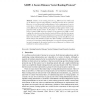Free Online Productivity Tools
i2Speak
i2Symbol
i2OCR
iTex2Img
iWeb2Print
iWeb2Shot
i2Type
iPdf2Split
iPdf2Merge
i2Bopomofo
i2Arabic
i2Style
i2Image
i2PDF
iLatex2Rtf
Sci2ools
133
click to vote
ACNS
2004
Springer
2004
Springer
S-RIP: A Secure Distance Vector Routing Protocol
Distance vector routing protocols (e.g., RIP) have been widely used on the Internet, and are being adapted to emerging wireless ad hoc networks. However, it is well-known that existing distance vector routing protocols are insecure due to: 1) the lack of strong authentication and authorization mechanisms; 2) the difficulty, if not impossibility, of validating routing updates which are aggregated results of other routers. In this paper, we introduce a secure routing protocol, namely S-RIP, based on a distance vector approach. In S-RIP, a router confirms the consistency of an advertised route with those nodes that have propagated that route. A reputation-based framework is proposed for determining how many nodes should be consulted, flexibly balancing security and efficiency. Our threat analysis and simulation results show that in S-RIP, a well-behaved node can uncover inconsistent routing information in a network with many misbehaving nodes assuming (in the present work) no two of t...
ACNS 2004 | Cryptography | Distance Vector Routing Protocols | Secure Routing Protocol | Wireless Ad Hoc Networks |
Related Content
| Added | 30 Jun 2010 |
| Updated | 30 Jun 2010 |
| Type | Conference |
| Year | 2004 |
| Where | ACNS |
| Authors | Tao Wan, Evangelos Kranakis, Paul C. van Oorschot |
Comments (0)

